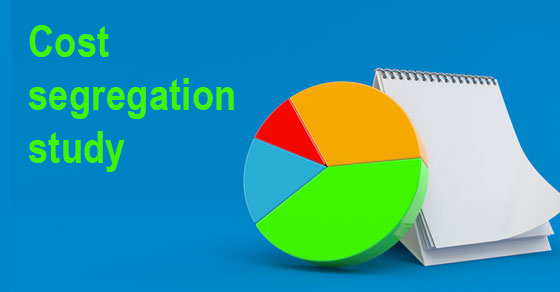Are you depreciating the cost of constructing the building that houses your business operations? If so, you may want to consider a cost segregation study.
By completing a study, you might be able to accelerate your depreciation deductions to decrease taxes and increase cash flow.

Under current law, the possible benefits of a cost segregation study are even greater than they were just a few years ago.
Fundamentals of depreciation
Generally, business buildings have a 39-year depreciation period (27.5 years for residential rental properties). Usually, you depreciate a building’s structural components, including walls, windows, HVAC systems, elevators, plumbing and wiring, along with the building. Personal property — such as equipment, machinery, furniture and fixtures — is eligible for accelerated depreciation, usually over five or seven years. And land improvements, such as fences, outdoor lighting and parking lots, are depreciable over 15 years.
Often, businesses allocate all or most of their buildings’ acquisition or construction costs to real property, overlooking opportunities to allocate costs to shorter-lived personal property or land improvements. In some cases — computers or furniture, for example — the distinction between real and personal property is obvious. But the line between the two is frequently less clear. Items that appear to be “part of a building” may in fact be personal property, like removable wall and floor coverings, removable partitions, awnings and canopies, window treatments, signs and decorative lighting.
In addition, certain items that otherwise would be treated as real property may qualify as personal property if they serve more of a business function than a structural purpose. This includes reinforced flooring to support heavy manufacturing equipment, electrical or plumbing installations required to operate specialized equipment, or dedicated cooling systems for data processing rooms.
Classify property into the appropriate asset classes
A cost segregation study combines accounting and engineering techniques to identify building costs that are properly allocable to tangible personal property rather than real property. Although the relative costs and benefits of a cost segregation study depend on your particular facts and circumstances, it can be a valuable investment.
The Tax Cuts and Jobs Act (TCJA) enhances certain depreciation-related tax breaks, which may also enhance the benefits of a cost segregation study. Among other things, the act permanently increased limits on Section 179 expensing, which allows you to immediately deduct the entire cost of qualifying equipment or other fixed assets up to specified thresholds.
The TCJA also expanded 15-year-property treatment to apply to qualified improvement property. Previously this break was limited to qualified leasehold improvement, retail improvement and restaurant property. And it temporarily increased first-year bonus depreciation to 100% (from 50%).
The savings can be substantial
Fortunately, it isn’t too late to get the benefit of speedier depreciation for items that were incorrectly assumed to be part of your building for depreciation purposes. You don’t have to amend your past returns (or meet a deadline for claiming tax refunds) to claim the depreciation that you could have already claimed. Instead, you can claim that depreciation by following procedures, in connection with the next tax return that you file, that will result in “automatic” IRS consent to a change in your accounting for depreciation.
Cost segregation studies can yield substantial benefits, but they’re not right for every business. We can judge whether a study will result in overall tax savings greater than the costs of the study itself. Contact your Rudler, PSC advisor at 859-331-1717 to find out whether this would be worthwhile for you.
RUDLER, PSC CPAs and Business Advisors
This week's Rudler Review is presented by Erin Mauch, Staff Accountant and Jane Frances, CPA.
If you would like to discuss your particular situation, contact Erin or Jane at 859-331-1717.


As part of Rudler, PSC's commitment to true proactive client partnerships, we have encouraged our professionals to specialize in their areas of interest, providing clients with specialized knowledge and strategic relationships. Be sure to receive future Rudler Reviews for advice from our experts, sign up today !